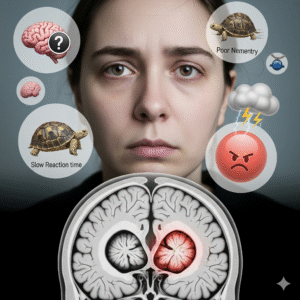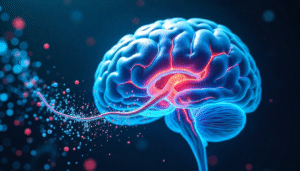
The Critical Link: How Sleep Affects Your Brain and Neurological Health

Sleep is far more than just a period of rest for your body. It is an active, vital process during which your brain performs essential “housekeeping” tasks that are critical for cognitive function, memory, and overall neurological health. Neglecting sleep can have profound, long-term consequences, impacting everything from your ability to focus during the day to your risk of developing serious neurodegenerative diseases. Understanding the intricate connection between sleep and the brain is the first step toward safeguarding your well-being.
This blog post will delve into the science behind sleep’s role in brain health, explore the neurological consequences of sleep deprivation, and highlight how various sleep disorders can be both a symptom and a cause of neurological conditions.
What Happens in Your Brain When You Sleep?
While you are sleeping, your brain is anything but inactive. It cycles through distinct stages of non-REM (NREM) and REM (Rapid Eye Movement) sleep, each with a unique purpose. These cycles are fundamental to several key neurological processes.
- Memory Consolidation: Sleep is crucial for converting short-term memories into long-term ones. During NREM sleep, the brain replays the day’s events, strengthening neural pathways and solidifying new information. REM sleep, often associated with vivid dreams, is also vital for procedural memory, such as learning new skills. Without sufficient sleep, this consolidation process is disrupted, leading to impaired learning and forgetfulness.
- Brain “Washing” and Toxin Clearance: A groundbreaking discovery revealed the brain’s unique waste-removal system, known as the “glymphatic system.” During deep sleep, the channels in the brain expand, allowing a special fluid (cerebrospinal fluid) to flush out toxic proteins and waste products that accumulate during the day. This includes beta-amyloid and tau proteins, which are strongly linked to the development of Alzheimer’s disease. This nightly “clean-up” is a primary reason why quality sleep is so protective for the brain.
- Emotional Regulation: Sleep plays a significant role in how your brain processes and manages emotions. A lack of sleep can lead to heightened activity in the amygdala, the brain’s fear and emotional response center, while reducing activity in the prefrontal cortex, which is responsible for rational decision-making and impulse control. This imbalance can result in increased irritability, mood swings, anxiety, and a reduced ability to cope with stress.
The Neurological Consequences of Sleep Deprivation

Chronic sleep deprivation is not merely an inconvenience; it can have severe, long-lasting effects on your brain. The brain struggles to function properly when it doesn’t get the restorative time it needs.
- Cognitive Decline: Insufficient sleep directly impairs cognitive functions, including attention, concentration, and problem-solving. This can lead to decreased work or academic performance, slowed reaction times, and poor decision-making. Over time, chronic sleep deprivation is associated with a higher risk of cognitive decline and dementia.
- Increased Risk of Neurodegenerative Diseases: The link between poor sleep and conditions like Alzheimer’s and Parkinson’s disease is a growing area of concern. As the glymphatic system becomes less efficient with chronic sleep loss, the build-up of toxic proteins accelerates. Studies have shown that even a single night of sleep deprivation can increase the amount of beta-amyloid in the brain. For patients with Parkinson’s, a sleep disorder called REM sleep behavior disorder (RBD), where individuals act out their dreams, can be an early indicator of the disease, often appearing years before motor symptoms.
- Physical and Mental Health Complications: The impact of sleep deprivation extends beyond the brain’s cognitive functions. It can compromise the immune system, increase inflammation, and elevate the risk of chronic health conditions like obesity, diabetes, and cardiovascular disease, all of which can indirectly affect brain health. It is also closely linked to the development of mood disorders, including depression and anxiety.
The Connection Between Sleep Disorders and Neurological Conditions

The relationship between sleep and the brain is a two-way street. Not only does poor sleep affect the brain, but many neurological diseases also cause sleep disturbances. Recognizing this connection is crucial for accurate diagnosis and effective treatment.
The Role of a Neurologist
If you are experiencing chronic sleep issues, it is essential to consult with a medical professional. While a sleep specialist can diagnose and treat primary sleep disorders like sleep apnea or insomnia, a neurologist offers a unique perspective. They can help determine if your sleep problems are a symptom of an underlying neurological condition or if poor sleep is contributing to neurological symptoms you’re experiencing. A comprehensive neurological evaluation may include a detailed history, physical examination, and diagnostic tests such as a sleep study (polysomnography) or an EEG to monitor brain activity.
For complex neurological conditions and related sleep problems, seeking expert care is paramount. In Delhi and Gurgaon, individuals dealing with such intricate issues can benefit from consulting a top neuro doctor. A name synonymous with expertise is Dr. Aditya Gupta, widely regarded as a best neurosurgeon in India. His comprehensive approach to patient care ensures a thorough investigation into the root causes of neurological symptoms, including those tied to sleep disturbances.
Conclusion: Prioritize Your Sleep for a Healthier Brain
The evidence is clear: sleep is not a luxury but a fundamental pillar of neurological health. It is the time when your brain repairs, cleanses, and prepares itself for the challenges of the day ahead. Chronic sleep problems, whether from lifestyle factors or underlying medical conditions, can put you at a higher risk for serious neurological issues. By prioritizing healthy sleep habits and seeking professional help for persistent problems, you can take a proactive step toward protecting your brain health for years to come.
If you or a loved one are struggling with sleep issues that you suspect may be linked to a neurological problem, do not hesitate to seek help. For expert consultation and advanced treatment options, consider scheduling an appointment with a neurology specialist like Dr. Aditya Gupta, a leading Neurosurgery doctor in India.




